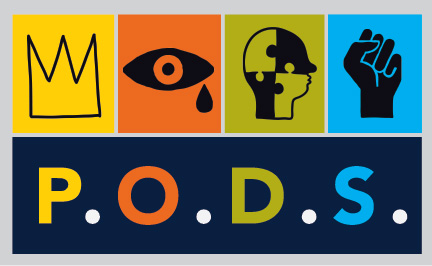
Duane Breijak, MSW ‘12, describes his unexpected path to social work and explains how program evaluation teaches social workers to measure impact and be effective in their efforts.
Watch video.
Program Evaluation & Applied Research
The Program Evaluation and Applied Research pathway provides students with an opportunity to develop advanced skills in program evaluation,and other qualitative and quantitative methodologies. The pathway will balance rigorous inquiry within social justice frameworks and will examine how research/evaluation informs social work policy and practice. Students interested in conducting evaluations (clinical practice, program, or policy), engaging in research, or pursuing a PhD should consider this pathway.
Careers
Examples of career (job) titles and positions relevant to this pathway include but are not limited to:
- Clinical Research Project Manager
- Community Development Specialist
- Consultant
- Data Manager/Management Specialist
- Evaluation and Improvement Analyst
- Foundation Project Officer
- Impact Measurement Specialist
- Legislative Financial Analyst
- PhD student
- Policy Analyst
- Presidential Management Fellow
- Program Evaluator/Program Evaluation Specialist
- Research Assistant or Research Associate
- Research Coordinator
- Strategy Analyst
- Survey Specialist
Field Experience
Types of agencies and settings where students in this pathway may engage in field learning:
- Healthcare systems (such as clinical research, quality improvement units)
- County-based community and economic development units
- City and State government planning units
- Social science research labs/centers
- Research institutes
- National organizations
- Foundations, Corporations, Social Impact/Social Entrepreneur organizations
- Evaluation Firms
Program Details
Program Evaluation and Applied Research Pathway Course Requirements
Essentials
- SW505: Engaging Social Justice, Diversity, and Oppression in Social Work, 3 credits
- SW506: Essentials of Interpersonal Practice, 4 credits
- SW507: Research Basics for Social Work Practice, 1 credits
- SW508: Essentials of Social Welfare Policy, 3 credits
- SW509: Essentials of Community and Organizational Practice, 3 credits
- SW590: Introduction to Social Work Practice, 1 credits
- SW649: Practicing Policy with Current Events, 1 credits
- SW678: Program Evaluation and Applied Research, 3 credits
- SW699: Social Work Capstone, 1 credits
Pathway Requirement
- SW670: Qualitative Methodologies for Socially Just Inquiry, 3 credits
- SW671: Quantitative Methodologies for Socially Just Inquiry, 3 credits
Please see course planning worksheets for a full list of courses associated with this pathway.
Competencies for Program Evaluation and Applied Research
University of Michigan's School of Social Work (U-M SSW) is accredited by the Commission on Accreditation (COA), of the Council on Social Work Education (CSWE). Accreditation is a system of recognizing educational programs as having a level of performance and quality that gain them the confidence of the educational community and the public. You can read more about the Educational Policy and Accreditation Standards here.
At U-M SSW, each pathway has specialized competencies that describe the knowledge, values, skills, and cognitive and affective processes that comprise the competency in each pathway area.
1. Demonstrate Ethical and Professional Behavior
Social workers demonstrate the ability to apply ethical social work principles and critical thinking to products and work produced. Social workers understand the role of emotional intelligence and professional resilience in professional and ethical practice. Social workers understand the role of other professionals when engaged in interprofessional teams within their areas of specialization. Social workers recognize the importance of life-long learning and ways that supervision and consultation can support continued development.
Practice Behaviors:
- Utilize supervision and consultation to guide professional decision-making.
- Demonstrate emotional intelligence in practice and professional situations.
- Utilize effective communication strategies appropriate to context.
2. Engage Diversity and Difference in Practice
Social workers critically assess the role of social identity, power, privilege, and diversity within applied research and evaluation practice.
Practice Behaviors:
- Engage with and across diverse populations within evaluation and research practice.
- Identify and address systems of power, privilege and oppression and the forces that may lead to inequities and marginalization within the practice of evaluation and research.
- Demonstrate fluency in a variety of communication styles to effectively engage and work with people of different political ideologies, interests, religious and cultural backgrounds, and points of view.
3. Advance Human Rights and Social, Economic, and Environmental Justice
Social workers understand the importance of a human rights framework to explore issues of social, economic, and environmental justice. Social workers develop knowledge, apply theories, and practice critical skills to advance human rights and social, economic, and environmental justice.
Practice Behaviors:
- Identify issues, develop strategies, evaluate outcomes, and promote human rights and social justice with affected clients and constituencies.
- Engage members of society in designing, evaluating, and promoting programs and services that address human rights to access resources that ensure social, economic, and environmental equity.
- Identify and engage key stakeholders in the evaluation and research process to advocate for access to resources, services, benefits, and opportunities for vulnerable and marginalized clients, constituencies, and communities.
4. Engage in Practice-informed Research and Research-informed Practice
Social workers apply the principles of logic, scientific inquiry, culturally-informed and ethical approaches to build knowledge and gather evidence to inform practice and understand how practice informs research.
Practice Behaviors:
- Design and administer quantitative and qualitative research methods to advance the evidence base of social work, social service, and human service practices.
- Monitor and evaluate processes and outcomes of programs and interventions.
5. Engage in Policy Practice
Social workers understand how to analyze, formulate, and advocate for policies that advance human rights and social, economic, and/or environmental justice through the application of critical thinking skills. Social workers are able to identify how current events are linked to policy issues, how to critically analyze and understand policy implications, and apply strategies to engage in policy practice that effect change and advocate for clients.
Practice Behaviors:
- Identify how current events are linked to policy issues impacting clients and client systems.
- Analyze the implications of policy across service systems.
- Identify strategies to engage with policy to advocate for clients and client systems.
6. Engage with Individuals, Families, Groups, Organizations, and Communities
Social workers protect human subjects, practice ethically, and strive for integrity in all aspects of research and evaluation.
Practice Behaviors:
- Demonstrate professional use of self when engaging key stakeholders in the planning and implementation of research and evaluation studies.
- Describe and explain the ethical implications of research designs, sampling strategies and other methodological decisions.
7. Assess Individuals, Families, Groups, Organizations, and Communities
Social workers assess and analyze assets, needs, benefits, gaps in services, rights, and the inequitable distribution of resources and power to identify appropriate interventions.
Practice Behaviors:
- Know how to select assessments, standardized sales and/or develop new scales using appropriate metrics, analytical methods, frameworks, and tools to meet the needs of the client population being assessed.
- Know how to use primary data sources, secondary data sources, and the lived experience of affected individuals, families, groups within organizations, communities and policy arenas.
- Demonstrate the ability to calculate and interpret basic statistics to report assessment results for decision-making.
8. Intervene with Individuals, Families, Groups, Organizations, and Communities
Social workers critically analyze research and evaluation results to inform intervention development and modifications.
Practice Behaviors:
- Use appropriate methods and tools to research and evaluate programs, interventions and services.
- Collaborate with stakeholders to make appropriate recommendations to foster program improvements and inform new program designs.
9. Evaluate Practice with Individuals, Families, Groups, Organizations, and Communities
Social workers demonstrate analytical and reporting skills in the consumption, production, and dissemination of knowledge in research and evaluation.
Practice Behaviors:
- Select appropriate evaluation and research questions to facilitate documentation, improvement, or alteration of programs, policies, or community processes and outcomes, with a focus on culturally responsive practice.
- Demonstrate the ability to use and apply quantitative and qualitative data analyses and current technologies to inform and enhance evaluation and research activities.
- Use and translate evaluation and research results to inform decision-making.
The graduate courses listed below have been taken by previous MSW students or have been identified as being of possible interest to students in this pathway and can be taken to fulfill Pathway Required Electives. On the course planning worksheet, information regarding Pathway Required Electives is included.
There are many other courses not listed below that may be of interest and may also meet the elective requirement. If you identify a pathway-related course not listed below that you want to take to meet your Pathway Required Electives (rather than simply an elective), please contact the Technical Advisors ([email protected]) for approval.
Interest in courses numbered below 500 should be checked for graduate-level status since many are offered for undergraduate credit only. You can check this by contacting the department offering the course or contacting the SSW registrar ([email protected]).
In addition, some courses may be restricted, require prerequisites, not be open to social work students, and/or require instructor permission. If you encounter problems registering for these courses, please contact the department offering the course. The SSW registrar will not be able to assist with registration in outside courses because these courses are not offered by the SSW.
The courses listed below are offered in various semesters. To see if a course is offered in the term you are interested please check the SSW list of outside courses, the website of the department offering the course, or the Wolverine Access Class Search page.
If you want to use one of these non-School of Social Work courses to fulfill the Program Evaluation & Applied Research Required Electives (SWrER), you will need to fill out a course substitution to receive approval. In the "Rationale for Substitution" box you should reference this page.
Anthropology - Cultural
- ANTHRCUL 558 - Current Issues in Sociocultural Anthropology
Economics
- ECON 405 - Introduction to Statistics
Entrepreneurship
- ENTR 560 - Project Management and Consulting
Health Behavior & Health Education
- HBEHED 622 - Program Evaluation in Health Education
- HBEHED 624 - Need Assessment Methods for Behavioral and Educational Health Programs
- HBEHED 660 - Theory, Research and Practice in Adolescent Health
Health Management & Policy
Information, School of
Political Science
- POLSCI 815 - Categorical Analysis
Psychology
- PSYCH 854 - Seminar in Advanced Personality: Research Techniques
Public Policy
- PUBPOL 647 - Data Analysis Using Excel I
- PUBPOL 648 - Data Analysis Using Excel II
Ross School of Business, Business Administration
- BA 670 - Impact Studio: Translating Research into Practice
Sociology
- SOC 510 - Statistics
Statistics
- STATS 401 - Applied Statistical Methods II
- STATS 406 - Computational Methods in Statistics and Data Science
- STATS 425 - Introduction to Probability
Strategy
- STRAT 566 - Systems Thinking for Sustainable Development and Enterprise
Technology & Operations
- TO 566 - Applied Regression and Data Analysis
Urban Planning
- UP 500 - Professional Practice/Planning Research
- UP 507 - Geographic Information Systems (GIS)
Learn More About Social Work
Pathway Faculty
Student Profiles
Student Profile
Joanna Jaimes
Joanna Jaimes is a first generation college student born to Mexican immigrant parents. As the oldest of four children, she played an important part in her family as a role model and helped her single mother raise her siblings. Joanna attended four elementary schools within the span of three years after her family experienced housing instability. With the help of family members and a supportive community, her family was able to find stability. Joanna took on a leadership and caretaker role in her family from a young age as she remembers translating for her mother at her siblings’ parent-teacher conferences. “I was doing things that too many kids of immigrant parents experience. I was frustrated that my family did not have the resources that my friends did, and I didn’t understand why we couldn’t be like everyone else,” she recalls. Joanna says that these lived experiences have motivated her to be a force in her community and advocate for socially just service provision for low income and underrepresented families.
Joanna went on to attend Calvin University in Grand Rapids and received a Bachelors degree in Social Work and Political Science. She thought that she would become a therapist, but she wanted to be active in wide scale change. After learning about how social work and politics intertwined, Joanna decided that she wanted to become a macro social worker.
Student Profile
Mislael A. Valentín Cortés
Growing up in a small town in Puerto Rico, Mislael Valentín-Cortés witnessed firsthand how inequality, health disparities, and social injustice affected close relatives and friends. Deeply concerned about these issues, Mislael considered social work early on as a vehicle for social change.
However, given limited resources and lack of BSW programs at his undergraduate institution, he focused his coursework on English and Social Sciences, yet focused his extracurricular activities on community outreach and empowerment, health promotion, and mental health awareness. He then learned of the Future Public Health Leaders Program, a summer internship program designed to increase representation of underserved populations in public health at the University of Michigan.
Through this program, Mislael’s interest in social justice and health equity was cemented, “Growing up, I had experienced the results of systemic injustice and health issues at all levels, yet my perspective was broadened through FPHLP because I learned of health equity issues on a national and global scale.”
“My time in Michigan over the summer was so impactful, that I decided to return for grad school,” he adds.








